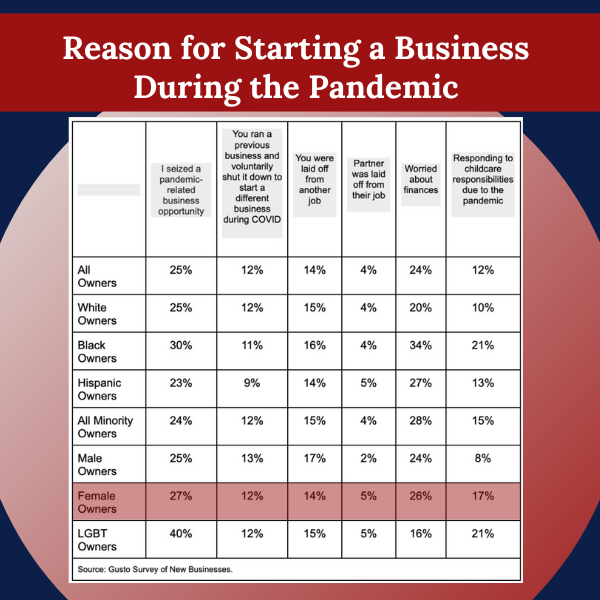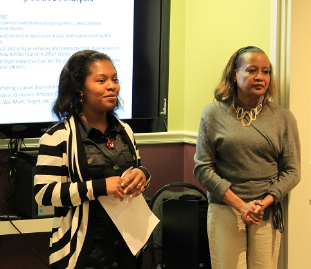Despite the economic turbulence over the past several years, female and minority entrepreneurs are creating new businesses in record numbers. Although nearly one-in-three small businesses closed during the pandemic, a wave of female entrepreneurs has seized new opportunities by identifying market demands. Women have turned to entrepreneurship to address their need for flexibility due to child-care responsibilities, and a desire for financial and career independence.

Increase in Women Entrepreneurs
With female-run businesses on the rise, the Women’s Foundation of Boston (WFBoston) and its grantee partners understand the importance of continuing that upward momentum through support and funding. A recent Gusto Survey revealed that between 2019 and 2021, women entrepreneurs increased from 28% to 49%. In that period, the upturn of black or African American female entrepreneurs tripled from 3% to 9%. In fact, over the past 20 years, there has been a 114% boost in female entrepreneurs. With a mission of economically empowering women and girls, WFBoston is working to level the playing field for these business leaders, but there is still much work to be done.
Women Encounter Deficits in Funding
Although the statistics are promising, women continue to face barriers to entrepreneurship on many levels. The Harvard Business Review recently reported that less than 3% of all venture capital investments went to female-founded companies, and less than 15% of women are the “check writers” on venture capital investing. The benefit of women investing in women is also in question. Second-round funding is often difficult to attain if first-round funding is derived solely from female investors. Venture capital companies need to work with these ground-breakers to ensure that funding comes from varying sources.
Obstacles to Entrepreneurship for Women
Funding is one of many obstacles women encounter. When Business News Daily asked female CEOs about the challenges faced by women entrepreneurs, the most significant barriers included the following:
- Access to funding
- Struggling to be taken seriously
- Finding a good support network
- Balancing business and family life
Similarly, a 2017 report by the think tank Third Way classified the roadblocks faced by women entrepreneurs into three main categories: human (education and experience), social (networks), and financial (sources of funding). Overcoming these barriers requires change on many fronts, including increased access to venture capital funding, a greater emphasis on networking and mentoring, and more opportunities for women to advance in business.

Working to Level the Playing Field
Women’s Foundation of Boston’s (WFBoston) grantee partner, the Center for Women and Enterprise (CWE), is helping aspiring women entrepreneurs and business owners to launch and grow their business by meeting them where they are and providing greater access to the resources, tools, and support they need to achieve business success. Since opening its doors in 1995, CWE has worked with more than 65,000 women, helping them create almost 60,000 new jobs, generating $1.7 billion in wages.
CWE Is Preparing Entrepreneurs
The Center for Women and Enterprise (CWE) offers women of all racial, ethnic, and socio-economic backgrounds the education, training, technical assistance, and mentoring necessary to empower them to succeed. Through CWE programming, clients gain confidence and competence, increase valuable networking connections, and boost financial knowledge. As a result, these women financially provide for themselves, their families, and their communities through their new businesses.
Global Impact of More Female Entrepreneurs
Increasing the number of female entrepreneurs not only benefits women and girls—it could have a significant impact on the global economy. According to a 2019 Boston Consulting Group (BCG) article, closing the gender gap by increasing the participation of women entrepreneurs would lead to a global GDP rise of approximately 3% to 6%. It would boost the global economy from $2.5 trillion to $5 trillion. For this to happen, however, female entrepreneurs need assistance from organizations like CWE to provide them with the tools they need to advance and achieve.
Invest in Women and Girls by Donating Today
While the number of female entrepreneurs is increasing, the reality is that only 22.4% of small business owners in the US are women. We need your help to continue the upward trend over the past several years. Donating to the Women’s Foundation of Boston will support the mission of economically empowering women and girls, and help organizations like the Center for Women and Enterprise to provide the essential tools for entrepreneurial growth. Please DONATE today and empower women to thrive!

 Laurie H. Glimcher, MD, was named President and CEO of the Dana-Farber Cancer Institute in 2016. She is also Director of the Dana-Farber/Harvard Cancer Center and the Richard and Susan Smith Professor of Medicine at Harvard Medical School. Previously, she was the Stephen and Suzanne Weiss Dean and Professor of Medicine of Weill Cornell Medicine and Provost for Medical Affairs of Cornell University. Dr. Glimcher is a distinguished immunologist, widely renowned for her work in one of the most promising areas of cancer research.
Laurie H. Glimcher, MD, was named President and CEO of the Dana-Farber Cancer Institute in 2016. She is also Director of the Dana-Farber/Harvard Cancer Center and the Richard and Susan Smith Professor of Medicine at Harvard Medical School. Previously, she was the Stephen and Suzanne Weiss Dean and Professor of Medicine of Weill Cornell Medicine and Provost for Medical Affairs of Cornell University. Dr. Glimcher is a distinguished immunologist, widely renowned for her work in one of the most promising areas of cancer research. Linda Henry is the CEO of the Boston Globe Media Partners. She is a co-founder of HUBweek, a civic collaboration between the Boston Globe, Harvard University, Massachusetts General Hospital, and MIT that explores the future being built at the intersection of art, science and technology. Linda is also an early-stage impact investor, an Emmy-Award winning television producer with two shows currently airing, and a community activist. She serves as a director of the Red Sox Foundation, is a trustee of the Liverpool Football Club Foundation, chair of the Boston Globe Foundation, and chairman of the John W. Henry Family Foundation. In addition, she is a founder of the Boston Public Market, serves on the advisory board of MassChallenge, and is on the board of the Engine at MIT. She earned a BS from Babson College and her MS from MIT.
Linda Henry is the CEO of the Boston Globe Media Partners. She is a co-founder of HUBweek, a civic collaboration between the Boston Globe, Harvard University, Massachusetts General Hospital, and MIT that explores the future being built at the intersection of art, science and technology. Linda is also an early-stage impact investor, an Emmy-Award winning television producer with two shows currently airing, and a community activist. She serves as a director of the Red Sox Foundation, is a trustee of the Liverpool Football Club Foundation, chair of the Boston Globe Foundation, and chairman of the John W. Henry Family Foundation. In addition, she is a founder of the Boston Public Market, serves on the advisory board of MassChallenge, and is on the board of the Engine at MIT. She earned a BS from Babson College and her MS from MIT. Bekah Salwasser joined the Red Sox Foundation as the Executive Director in January of 2018. She earned her B.A. in Psychology from Brown University and has extensive experience in philanthropy and both professional and semi-professional sports. After four years working as Community Relations Director for the Boston Celtics, Bekah went on to lead Scholar Athletes as its Executive Director, a program that supports public high school athletes with both their athletic and academic achievements. Earlier in her career, Bekah served as a professional soccer player for the Boston Breakers and as Executive Director of the Charlestown Lacrosse and Learning Center.
Bekah Salwasser joined the Red Sox Foundation as the Executive Director in January of 2018. She earned her B.A. in Psychology from Brown University and has extensive experience in philanthropy and both professional and semi-professional sports. After four years working as Community Relations Director for the Boston Celtics, Bekah went on to lead Scholar Athletes as its Executive Director, a program that supports public high school athletes with both their athletic and academic achievements. Earlier in her career, Bekah served as a professional soccer player for the Boston Breakers and as Executive Director of the Charlestown Lacrosse and Learning Center. Kimberly Fay Boucher is a business executive who has driven high performance organizations in technology, consumer products and social enterprise/nonprofit industries over the past 25 years. She is currently the Technology Commercialization Business Leader for the CTO at Analog Devices, where she is responsible for driving new technologies from incubation stages to successful businesses. Kim is also a Senior Lecturer at the MIT Sloan School of Management, where she teaches Disciplined Entrepreneurship in the Martin Trust Center. She holds a BS in Management Industrial Engineering from Worcester Polytechnic Institute and an MBA from Harvard Business School. She is a NCAA Academic All-American Women’s Basketball player and has been inducted into the WPI Hall of Fame.
Kimberly Fay Boucher is a business executive who has driven high performance organizations in technology, consumer products and social enterprise/nonprofit industries over the past 25 years. She is currently the Technology Commercialization Business Leader for the CTO at Analog Devices, where she is responsible for driving new technologies from incubation stages to successful businesses. Kim is also a Senior Lecturer at the MIT Sloan School of Management, where she teaches Disciplined Entrepreneurship in the Martin Trust Center. She holds a BS in Management Industrial Engineering from Worcester Polytechnic Institute and an MBA from Harvard Business School. She is a NCAA Academic All-American Women’s Basketball player and has been inducted into the WPI Hall of Fame. Ami Kuan Danoff (Co-Founder and CFO) is a private investor and the trustee of a foundation. She is a Harvard Quantum Founder and a member of the Harvard FAS Dean’s Council. Ami earned a bachelor’s degree from Harvard University in Visual and Environmental Studies and holds a dual master’s degree in Applied Economics and International Finance from the Sloan School of Management at MIT. She was a portfolio manager in global equities at Putnam Investments and co-manager of the Putnam International New Opportunities Fund, and also worked as an international equities analyst at Fidelity Investments.
Ami Kuan Danoff (Co-Founder and CFO) is a private investor and the trustee of a foundation. She is a Harvard Quantum Founder and a member of the Harvard FAS Dean’s Council. Ami earned a bachelor’s degree from Harvard University in Visual and Environmental Studies and holds a dual master’s degree in Applied Economics and International Finance from the Sloan School of Management at MIT. She was a portfolio manager in global equities at Putnam Investments and co-manager of the Putnam International New Opportunities Fund, and also worked as an international equities analyst at Fidelity Investments. Christina Heenan Suh holds an MBA from Harvard Business School, a bachelor’s degree from the University of Pennsylvania in English and Marketing and a master’s from Columbia University. A former management consultant, her work focused on strategy and implementation projects for Fortune 100 clients. She was also an account executive at Hill+Knowlton (WPP) marketing consumer packaged goods. As an Executive Board Member of the Brookline Education Foundation, which funds professional development in the Brookline Public Schools, Christina led their Grant and Oversight Committees. She currently sits on the board of the Brookline Library Foundation and teaches ESL at Rosie’s Place in Boston.
Christina Heenan Suh holds an MBA from Harvard Business School, a bachelor’s degree from the University of Pennsylvania in English and Marketing and a master’s from Columbia University. A former management consultant, her work focused on strategy and implementation projects for Fortune 100 clients. She was also an account executive at Hill+Knowlton (WPP) marketing consumer packaged goods. As an Executive Board Member of the Brookline Education Foundation, which funds professional development in the Brookline Public Schools, Christina led their Grant and Oversight Committees. She currently sits on the board of the Brookline Library Foundation and teaches ESL at Rosie’s Place in Boston. Christina Gordon (Co-Founder and CEO) holds a dual master’s degree in International Finance and Applied Economics from MIT’s Sloan School of Management. She earned her bachelor’s degree from Boston University and also studied for a joint master’s degree in Women’s Studies and Sociology at Brandeis with a focus on women in the workplace. Christina is a former assistant fund manager and technology industry equity analyst at Wellington Management. She also worked as a stock analyst at Fidelity Investments. She is a trustee of a private foundation, a member of Women Moving Millions and currently sits on the board of Rosie’s Place, a sanctuary for poor and homeless women in Boston.
Christina Gordon (Co-Founder and CEO) holds a dual master’s degree in International Finance and Applied Economics from MIT’s Sloan School of Management. She earned her bachelor’s degree from Boston University and also studied for a joint master’s degree in Women’s Studies and Sociology at Brandeis with a focus on women in the workplace. Christina is a former assistant fund manager and technology industry equity analyst at Wellington Management. She also worked as a stock analyst at Fidelity Investments. She is a trustee of a private foundation, a member of Women Moving Millions and currently sits on the board of Rosie’s Place, a sanctuary for poor and homeless women in Boston.